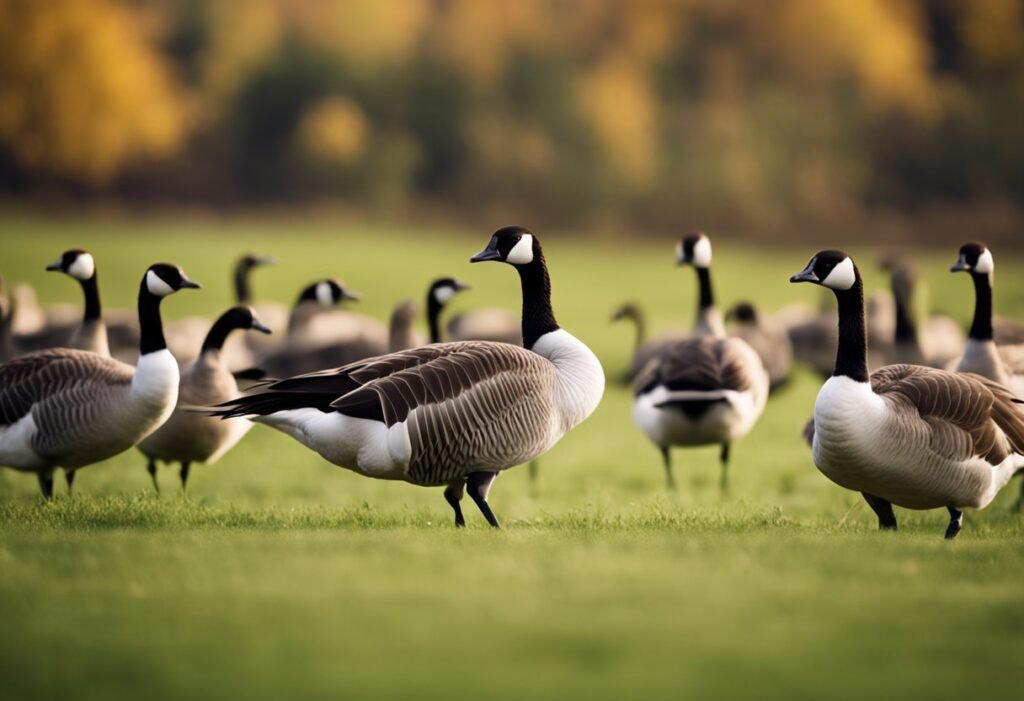Canadian geese are a common sight in many parts of North America, with their distinctive black heads and white cheeks. While these birds are often admired for their beauty and grace, some people wonder if they can be eaten. In this article, we will explore the question of whether or not Canadian geese are a viable food source.
To begin, it is important to note that Canadian geese are protected by law in many parts of North America, and hunting or killing them without a permit can result in serious legal consequences. However, in areas where hunting is allowed, Canadian geese are sometimes harvested for their meat. Some people even consider them a delicacy.
That being said, there are also concerns about the safety of eating Canadian geese. These birds are known to carry a variety of diseases, including avian influenza and West Nile virus. Additionally, they may be exposed to pollutants and toxins in their environment, which can accumulate in their flesh and potentially harm those who consume it.
Canadian Geese: An Overview

Canadian geese, also known as Canada geese, are a species of waterfowl that are native to North America. They are a popular game bird and are also commonly found in parks and other urban areas. In this section, we will provide an overview of Canadian geese, including their physical characteristics, habitat, diet, and whether they can be eaten.
Canadian geese are easily recognizable due to their distinctive black heads and necks, white cheek patches, and brownish-gray bodies. They are large birds, with a wingspan of up to six feet and a weight of up to 14 pounds. They are primarily herbivores, feeding on a variety of plants and grasses, but they will also eat insects and small fish.
Canadian geese are found throughout North America, from Alaska to Mexico. They prefer to live near water, such as lakes, rivers, and wetlands. They are also commonly found in urban areas, where they can be seen grazing on grass in parks and golf courses.
While Canadian geese are a popular game bird, there is some debate about whether they are safe to eat. Some people believe that they are too tough and gamey, while others argue that they can be prepared in a way that makes them delicious. It is important to note that Canadian geese can carry diseases such as avian influenza and should be handled and cooked properly to avoid any potential health risks.
In conclusion, Canadian geese are a unique and interesting species of waterfowl that are found throughout North America. While they are a popular game bird, their suitability for consumption is a matter of personal preference. As with any wild game, it is important to handle and cook them properly to ensure that they are safe to eat.
Legal Aspects of Hunting Canadian Geese

When it comes to hunting Canadian geese, there are a few legal aspects that hunters need to be aware of. In Canada, hunting regulations are managed by the Canadian Wildlife Service, a branch of Environment and Climate Change Canada.
Firstly, hunters must obtain the appropriate licenses and permits before hunting Canadian geese. These can vary depending on the province or territory where the hunting will take place. It is important to check with local authorities to ensure that all necessary permits have been obtained.
Secondly, there are specific hunting seasons for Canadian geese. These seasons are designed to ensure that the geese are not hunted during their breeding or nesting periods, which could have a negative impact on their population. The hunting season for Canadian geese typically runs from September to December, but this can also vary depending on the location.
Thirdly, there are restrictions on the types of firearms and ammunition that can be used for hunting Canadian geese. For example, shotguns are typically the only firearms allowed for hunting geese, and the use of lead shot is prohibited in many areas due to its potential impact on the environment.
Finally, there are also regulations around the number of geese that can be harvested during a hunting trip. These limits are in place to ensure that the population of Canadian geese remains stable and sustainable.
Overall, it is important for hunters to be aware of these legal aspects before embarking on a hunting trip for Canadian geese. By following these regulations, hunters can ensure that they are hunting in a safe, ethical, and sustainable manner.
Culinary Perspective on Canadian Geese

When it comes to Canadian geese, opinions on their taste can vary widely. Some people find the meat to be delicious, while others find it tough and gamey. Here, we’ll take a closer look at the culinary perspective on Canadian geese.
One thing to keep in mind is that Canadian geese are wild birds, and their diet and lifestyle can have a significant impact on the taste of their meat. Geese that have been feeding on a diet of grains and grasses tend to have a milder flavor, while those that have been eating fish or other strong-flavored foods may have a more intense taste.
Another factor to consider is the age of the bird. Younger geese tend to have more tender meat, while older birds can be tougher and more difficult to cook properly.
Despite the potential challenges, many people enjoy cooking and eating Canadian geese. Some popular preparation methods include roasting, grilling, and smoking. To help tenderize the meat, it’s often recommended to marinate the bird overnight before cooking.
Overall, while Canadian geese may not be a traditional culinary choice, they can be a tasty and unique addition to any meal. If you’re interested in trying goose meat for yourself, be sure to source it from a reputable supplier and take care to properly prepare and cook the bird.
Health Aspects of Eating Canadian Geese
Nutritional Values
Canadian geese are a good source of protein, iron, and vitamin B12. A 3.5-ounce serving of cooked goose meat provides about 30 grams of protein, which is more than half of the recommended daily intake for an adult. It also contains about 2.7 milligrams of iron, which is approximately 15% of the recommended daily intake for an adult. Additionally, goose meat is a good source of vitamin B12, which is essential for maintaining healthy nerve cells and red blood cells.
Potential Risks
While Canadian geese are safe to eat, there are a few potential risks that should be considered. First, it is important to ensure that the meat is cooked thoroughly to avoid the risk of foodborne illness. Second, Canadian geese may contain high levels of environmental contaminants, such as lead and pesticides, which can be harmful to human health. Therefore, it is recommended to limit consumption of goose meat to once per month.
It is also important to note that hunting and eating Canadian geese may not be legal in all areas. It is important to check with local authorities and obtain any necessary permits before hunting or consuming Canadian geese.
In summary, Canadian geese can be a nutritious and tasty addition to a balanced diet, but it is important to be aware of potential risks and to consume them in moderation.
Cultural Significance of Eating Canadian Geese
Eating Canadian geese has been a part of the culinary culture in North America for centuries. The indigenous peoples of Canada and the United States have hunted and consumed geese for their meat, feathers, and bones. They have also used geese in their traditional ceremonies and rituals.
In modern times, Canadian geese have become a popular game bird among hunters. The meat of Canadian geese is considered a delicacy by many people. It is known for its rich flavor and tender texture. Canadian geese are also a source of protein, iron, and other essential nutrients.
Despite its popularity, there are some cultural and ethical considerations when it comes to eating Canadian geese. Some people believe that geese should not be hunted or eaten because they are a symbol of Canada and represent the country’s national identity. Others argue that hunting and eating geese is a way to connect with nature and respect the land.
In conclusion, the cultural significance of eating Canadian geese is a complex issue that involves history, tradition, and personal beliefs. While some people may choose not to eat geese for cultural or ethical reasons, others may enjoy the taste and nutritional benefits of this game bird. Regardless of one’s stance on the matter, it is important to respect the opinions and traditions of others.
Environmental Impact of Hunting Canadian Geese
Hunting Canadian geese has both positive and negative environmental impacts. On one hand, hunting can help control the population of geese, which can prevent overgrazing and damage to crops. Additionally, hunting can provide a source of food for humans and can contribute to the local economy.
However, hunting can also have negative impacts on the environment. Overhunting can lead to a decline in the population of geese, which can have negative effects on the ecosystem. Additionally, hunting can cause stress and disturbance to other wildlife in the area.
It is important for hunters to follow regulations and guidelines set by local authorities to ensure that hunting is done sustainably and responsibly. This includes adhering to bag limits, hunting during designated seasons, and using non-toxic shot to prevent contamination of the environment.
Overall, hunting Canadian geese can have both positive and negative impacts on the environment. It is important for hunters to be aware of these impacts and to hunt responsibly to ensure the sustainability of the ecosystem.
Conclusion

In summary, Canadian geese can be eaten, but there are some considerations to keep in mind. The meat is lean and has a gamey flavor, which some people enjoy. However, it can be tough if not cooked properly.
It’s important to note that Canadian geese are protected under the Migratory Birds Convention Act, and hunting them without a permit is illegal. Additionally, they may carry diseases and parasites, so it’s crucial to handle and cook the meat safely to avoid any health risks.
Overall, while it is possible to eat Canadian geese, it’s not a common or widely accepted practice. We recommend sticking to more traditional and readily available meats for your meals.
Frequently Asked Questions
What is the taste of Canada goose meat?
Canada goose meat has a rich, gamey flavor that is similar to beef. It is often described as having a slightly sweet and nutty taste. The meat is lean and has a firm texture, making it ideal for roasting or grilling.
What are the uses of Canadian geese?
Canadian geese are primarily hunted for their meat, which is considered a delicacy by many. In addition to their meat, their feathers are also used for making clothing and other items. They are also popular as decoys for hunting other waterfowl.
Is it legal to kill Canadian geese in Virginia?
Yes, it is legal to kill Canadian geese in Virginia, but there are regulations in place to ensure that the population is not over-hunted. Hunters must have a valid hunting license and follow specific guidelines for hunting geese.
Can Canadian geese be hunted in Illinois?
Yes, Canadian geese can be hunted in Illinois, but hunters must have a valid hunting license and follow specific guidelines for hunting geese. There are also regulations in place to ensure that the population is not over-hunted.
Are Canadian geese good to eat?
Yes, Canadian geese are good to eat. The meat is lean and has a rich, gamey flavor that is similar to beef. It is often considered a delicacy and is enjoyed by many hunters and non-hunters alike.
Do hunters consume Canada geese meat?
Yes, many hunters consume Canada geese meat. It is considered a delicacy and is often prepared in a variety of ways, including roasting, grilling, and smoking. Some hunters also donate their excess meat to food banks and other charitable organizations.





